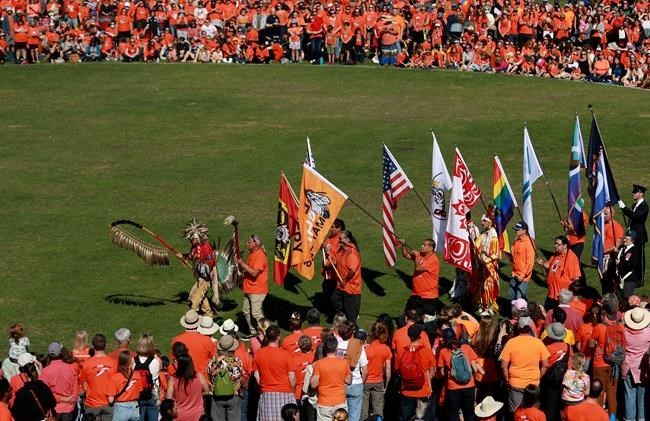VICTORIA — The British Columbia government introduced legislation Tuesday to make Sept. 30 a statutory holiday to mark the National Day for Truth and Reconciliation, a recognition that Labour Minister Harry Bains said will provide opportunities to hold annual commemoration events similar to Remembrance Day.
Bains introduced a bill in the legislature, saying the holiday will be observed this year and every Sept. 30 afterwards.
The sa╣·╝╩┤½├Į holiday follows the federal government's decision in 2021 to declare Sept. 30 a national truth and reconciliation holiday for its workers.
"I'm proud and humbled to be part of what I consider a historic step as a British Columbian," said Bains at a news conference following the introduction of the National Day for Truth and Reconciliation Act.
"This day provides an annual opportunity for people to learn about our colonial history and how it has impacted Indigenous communities, and to participate in commemorative events in a way similar to Remembrance Day," he said.
Those ceremonies are held across sa╣·╝╩┤½├Į every Nov. 11 to honour the sacrifices of the casualties of war and military members who serve the country.
"Reconciliation is about each and every one of us," Bains said. "All British Columbians and Canadians have a role to play. This new statutory holiday in sa╣·╝╩┤½├Į will allow more people to get involved in advancing reconciliation."
He said all workers in sa╣·╝╩┤½├Į will be covered by the province's Employment Standards Act and will be entitled to a paid day off every Sept. 30.
Prior to the introduction of the act, business, labour, Indigenous and social groups were consulted about a new statutory holiday, Bains said.
Bains told the legislature the government's decision on the holiday is in response to the Truth and Reconciliation Commission’s call to action No. 80, which requested the federal government establish a holiday to honour residential school survivors, their families and communities.
sa╣·╝╩┤½├Į will join Prince Edward Island, the Northwest Territories, Nunavut, Yukon and sa╣·╝╩┤½├Į as jurisdictions that have already designated Sept. 30 as a statutory holiday, if the legislation passes. New Brunswick has made the day a provincial holiday but says it's optional for the private sector.
Murray Rankin, sa╣·╝╩┤½├Į's Indigenous relations and reconciliation minister, said the holiday will provide opportunities for people to understand and reflect on a time in sa╣·╝╩┤½├Į's history when children were forced to attend schools that stripped them of their culture and caused emotional and physical harm.
"I can say we will all recall the shock, the sadness, the anger that followed the findings at the Kamloops residential school," he said. "Many Indigenous children suffered physical, emotional, psychological and sexual abuse at these institutions, and sadly many Indigenous children died at them."
Chief Rosanne Casimir of the Tk’emlups te Secwepemc First Nation reported in May 2021 the discovery by ground-penetrating radar of what were believed to be possible remains of more than 200 children at the site of the former Kamloops Indian Residential School.
Similar reports of possible remains at residential school sites at former institutions across sa╣·╝╩┤½├Į have been made since the Kamloops discovery.
The Kamloops residential school operated between 1890 and 1969, when the federal government took over operations from the Catholic Church and ran it as a day school until it closed in 1978.
A 4,000-page report by the National Truth and Reconciliation Commission released in 2015 detailed harsh mistreatment at the schools, including emotional, physical and sexual abuse of children, and at least 4,100 deaths at the institutions.
The report cited records of at least 51 children dying at the Kamloops school between 1914 and 1963. Health officials in 1918 believed children at the school were not being adequately fed, leading to malnutrition, the report noted.
"This is the heavy truth of our history that we must confront as British Columbians and as Canadians," Rankin said. "Reconciliation is a process of healing relationships. It requires public truth telling, apology, commemoration that acknowledges and seeks to address past harms."
He said sa╣·╝╩┤½├Į has a responsibility to remember the children who never came home and honour residential school survivors.
Phyllis Webstad said she was "humbled and honoured" that her Orange Shirt Day campaigns have become part of the Sept. 30 National Day for Truth and Reconciliation.
Webstad started wearing an orange shirt on Sept. 30 to mark her first day of school as a child. She said residential school administrators took away her clothes, including her new orange shirt.
She said the statutory holiday ensures people no longer have an excuse "to not know what happened to us."
Premier David Eby says his government is taking the important step to enshrine the day in law to acknowledge the wrongdoings of the past, and to take meaningful action toward reconciliation.
"Many British Columbians have been marking Orange Shirt Day with humility, respect and reflection in their own way for years," says Eby in a statement, referring to a day that honours survivors and those who didn't return from residential schools.
Grand Chief Stewart Phillip, the president of the Union of sa╣·╝╩┤½├Į Indian Chiefs, says the day of reconciliation is welcome.
"For this day to be truly meaningful, it requires healing and capacity for change," Phillip says in a statement.
This report by The Canadian Press was first published Feb. 7, 2023.
Dirk Meissner, The Canadian Press



